 The protection of air quality is a priority for the European Commission and EU member states. Emission standards are currently in place for light–duty vehicles, including SVMs. ESCA has actively participated in emissions reduction policy making and committed to reducing emissions from our vehicles. Along with the European Commission, we foster and promote technological development to help protect the environment and reduce air pollution.
The protection of air quality is a priority for the European Commission and EU member states. Emission standards are currently in place for light–duty vehicles, including SVMs. ESCA has actively participated in emissions reduction policy making and committed to reducing emissions from our vehicles. Along with the European Commission, we foster and promote technological development to help protect the environment and reduce air pollution.
European SVMs are actively and continuously contributing towards improving fuel efficiency and have revealed plans to invest in the next generation of powertrains, hybridisation, lightweight materials and advanced aerodynamics, which will deliver significant improvement in fuel consumption and in turn benefit the wider industry.
Emissions has come to the forefront of automotive policy making in recent years, due to scandal and non-compliance within the wider industry. While ESCA members recognise that there is part to be played in reducing the emissions from vehicles and we are committed to do so, we advocate or exemptions and derogations for SVMs.
Under the current EU regulatory framework, small volume car manufacturers – registering less than 10,000 vehicles a year in the EU – can apply for a derogation In order to be granted a derogation, manufacturers must show a reduction in CO2 emissions levels and this must be proven to be in accordance with the companies’ overall reduction potential.
ESCA supports a derogation regime as our member’s contribution to the automotive sector’s overall emissions is negligible, on both European and global level. Furthermore, because of limited resources, our members depend to a great extent on buying in technologies from other manufacturers. Indeed, the average life cycle of their models is considerably longer than for larger manufacturers: the design and engineering cost of a vehicle model has to be amortised over a very small sales volume.
Moreover, small volume car manufacturers responsible for less than 1,000 new car registrations in the EU also benefit from a de-minimis exemption under the CO2 Regulation ESCA fully supports the exemption regime as the derogation procedures are a lengthy and complicated processes, requiring significant resources for both the European Commission and ESCA members. Indeed, according to the Commission’s impact assessment, the scale of CO2 emissions from vehicles produced by manufacturers registering less than 1,000 cars a year is estimated to be around 5,000 tonnes per year, “which is a marginal impact”.[1] Excluding the first 1,000 cars from EU CO2 legislation will not generate any issue in terms of competitiveness, as vehicles produced in this range typically do not have competition from large volume manufacturers.
ESCA calls on the Commission to continue to uphold both the derogation and exemption regimes in the new CO2 legislation. We continue to engage with the Commission and partners in the automotive industry to work cohesively to achieve the best result for all stakeholders involved.

